1. The Tapes he left Behind
On 23rd March 2017 my close and cherished friend Alan Griffiths died after a short illness. A great shock to all those who knew him. The unexpectedness added to the sense of loss. Alan dead! He was only 57, the same age as me, and our friendship was part-based on sharing and exploring a fund of media memories–music, film, TV–stretching back to our 1960’s childhoods. I had known Alan since 1981, the year he launched his post-punk outfit The Escape, which extended the dark, brooding vibe of his previous band Apartment.
In the melancholy aftermath of his death, a large box of reel-to-reel tapes and two scrapbooks were recovered from the “House of Secrets”, (as he had once dubbed his long term address, a semi in Downend). The recordings had been left mouldering in the loft for nearly forty years. On studying these, I was able to piece together a picture of Alan’s early music, recorded prior to his published and better-known work in Apartment, The Escape and Tears for Fears.
For those who only knew the later Alan, that house was indeed keeping secrets: Alan mate, you never told me –or anyone else you met later—that Apartment started out as a four-piece…or that a lot of that band’s early (and very tasty) songs were co-written with the fourth guy! (A mystery man with a plain name who is hence difficult to locate now). And you were a bit stingy with the truth when talking to journalists of the time (1980 or so) about your musical tastes and influences, which seemed to be recently-acquired, and impeccably New-Wavy, ignoring or blanking the musical heritage of the sixties to mid-seventies.
…But then again, altering or omitting parts of your back story to suit the expectations of the time is creative in its own way- it’s called self-invention-although it plays hell with trying to work out your true musical history from this distance!
Anyway mate, the tapes reveal that you’d really absorbed loads of musical influences from childhood onwards, and even written/performed/produced in some of their styles—Blues, Power Pop, even Rockabilly–by the time you were 20. (One of the first recordings is a Gary Glitter cover!)…. The Punk shockwave jolted you into an altogether higher level of creativity, with attractive, memorable songs pouring out in profusion, and then a chill bleakness creeping over the work, soon becoming your trademark.
2. Some History; Alan, an introduction
So, Alan’s early work is full of surprises; he worked in a variety of styles, track-laying some intriguing and capacious songs, before, at 19, following a calling to the dark side of the New Wave. We’ll explore all this in the following history. We start in 1976…
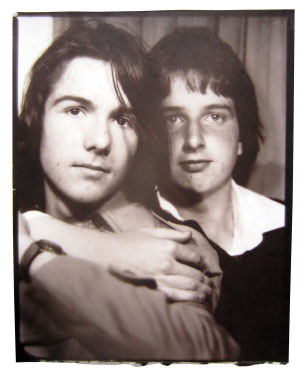
Feb ’76: Soundwell Technical College, Bristol. Alan Ralph Griffiths (1959-2017) meets Peter Large (16 at the time) with whom he will work at length later. He recruits Drummer Richard Smith (18) and Bassist Kevin Prior, from advert in Virgin records. Band name, if any, unknown.
AG is gifted a Sony upright ¼ Inch stereo Tape Recorder, on which all subsequent recordings are done till approx. 1979. An important acquisition; His burgeoning production skills are now given full range in the tracks he creates on this non-pro, domestic machine. He can now do fully-produced songs (nearly) by track-bouncing. In this process, a drum pattern (say) is first laid down, then a bass guitar part is superimposed on it and the result re-recorded on the tape’s second track. This frees up the first track to record lead-guitar added to the first two instruments, and the process is repeated, bouncing the accumulating recording between the two tracks. (The disadvantage of this method is what’s called generational loss of quality, especially in the treble, meaning the cymbals may disappear, or have to be re-recorded. Another problem: the vocals are done last, and if the other instruments are already too “big”, the tape may then overload. Considering what he was up against, the boy Al done good, in many of the tracks to be discussed).
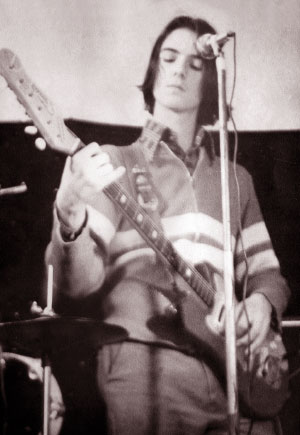
Aug ’76: AG writes and records songs with Barry Toner, including the breezy, upbeat That’s You, the pub-rocky Don’t Harm Me, and three sorrowing, reflective numbers: Feeling I’ve Had, Save Yourself for Tomorrow, and Cry Little Girl (the latter a huge ten-minute slowie, starting with just ad-libbed vocals and [flat!] acoustic guitar…then building, with the drumkit picking up later). In Outside Room we hear a nimble guitar solo from the 17-year-old Alan. Some of the other tracks are clearly works in progress, and you can often hear AG barking terse comments, or demanding another take, as he finds his feet as a producer.
Oct ’76: Band splits.
Late ’76: 2nd Year Soundwell; Spare Ribbs: AG meets and recruits latterly-noted local bluesman John Fenlon (20) as frontman, whilst retaining RS, who introduces Rhythm Guitarist Colin Cheeseworth, (who doesn’t stick), also Nigel Bird (16) on Bass guitar.
Dec ’76-May’77: A Blues interlude for AG as he and JF co-write/record lots of songs, including Danger in the Night, The Needle, A Song called Punk and Chloe. Many are indeed bluesy, with striking lead vocals from JF–by far the best singer Alan works with in these early days. The songs are certainly very different from his later output, sometimes reminiscent of Free, Canned Heat, or even Mott the Hoople/Ian Hunter–a cover of Once Bitten, Twice Shy is amusingly waylaid trying to get the beginning “ELLO!” right. (John recalls long creative sessions in Alan’s bedroom/studio, refreshed with tea and beans-on-toast brought by Alan’s mother…and worrying about missing the last bus home!)
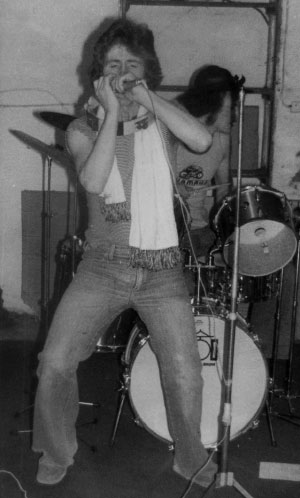
Apr ’77: Rehearsal session in the basement of Biggles Music, Old Market, Bristol, considered important enough for photographs to be taken; these survive in a scrapbook. It may be just a rehearsal, but we see JF fronting vigorously, harmonica-honking and tambourine-rattling the while, whilst relatively impassive lead-guitarist AG, (in Francis Rossi waistcoat!), concentrates on his strumming.
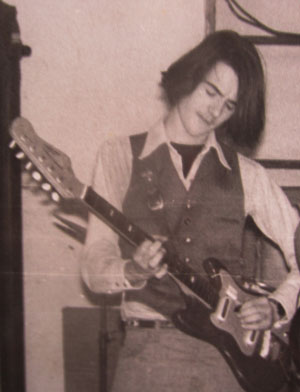
June ’77: “My first gig!” writes AG in the scrapbook. He’s describing a Student Union “Rock Party” at the Granary. This had advance publicity in the Bristol Evening Post, courtesy of James Belsey, complete with quotes from JF, the band’s spokesman: “We’ve been trying to find ourselves for the last five months and now we’re ready to play in front of an audience. Our music is standard Rock and Roll, and we take a professional approach. If we weren’t prepared for this first show we wouldn’t do the gig”. Fading pix again show JF confidently struttin’ his stuff, with girls agog, and demure AG now sporting a peek-a-boo haircut—like Phil Oakey to come—but still with downcast eyes, dutifully attending to his fingering. He has a vocal mike, but at this stage looks comfortable just as lead- guitarist/backing singer. A backdrop says “Sweet Home Alabama” (Yes! It is 1977, after all!)
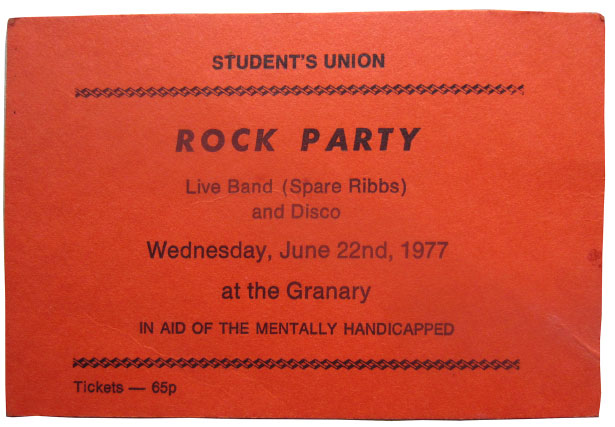
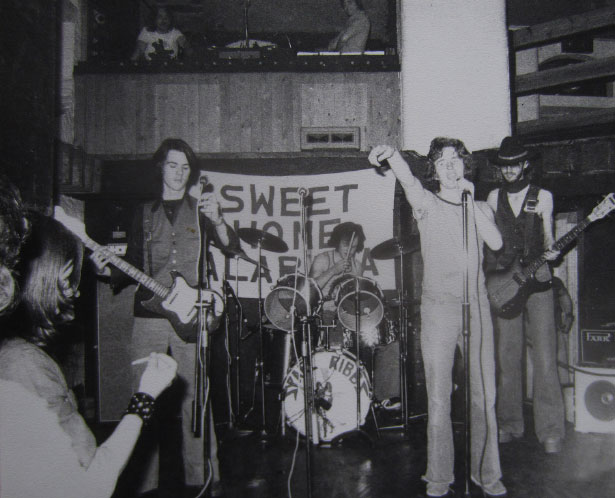
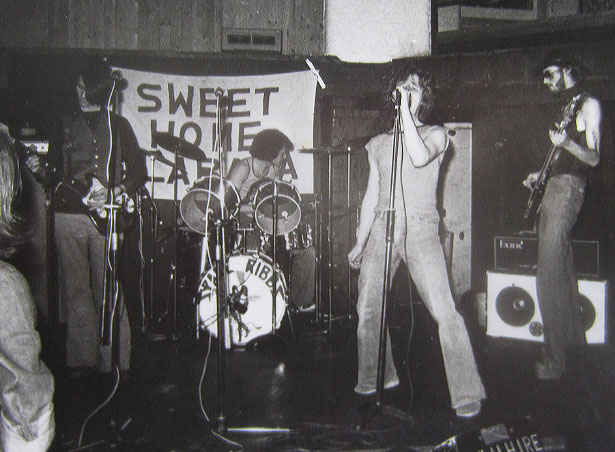
Aug ’77: JF leaves Spare Ribbs. PL joins on Rhythm Guitar. A left-hooker, like AG.
Sept ’77: Change of name to The Godzilla Band, although AG and PL want The Mess. They play two gigs, then…..
Nov ’77: Retaining the Mess moniker, Alan and Pete strike out on their own, following fresh ideas. Ditching the Blues, these are much more in tune with the emerging New Wave. Some of their efforts are tuneful takes on formula scout-hut punk, a few frankly dreadful–and badly recorded too–but others show a lot more promise, revealing a new, sombre, desolate mood.
Between November and April, the boys write and record around 30 songs, including the fast and percussive Energy! –murderous to play, as drummer Emil now recalls; The Unwanted Blues, (with the great first line: I used to walk where I wanned, till they put up a CURFEW!); a big success crossing the Velvets with Talking Heads in the choppy The Book, The Table, and again, getting the David Byrne jitters in the yelps and ululations of Don’t Tell the Devil; never minding the Buzzcocks in the hard-driving Oh Shit! I think I’m in love! and Sign of the Times; playing Heads-Bodies-Legs with the words in the cut-up, pop-absurdist The Free World; two exhilarating spins through Sham 69 territory with Alive and Kicking and They Wanna be Us!; anticipating Tears for Fears with the brief, wistful An Hour, (a rare and attractive Griffiths ballad…quick…then gone, like the man himself. Somehow elegiac now, it explores a doomed, romantic side Alan never otherwise acknowledges); name-checking Mister Carl Perkins, Electric Guitar! in the totally unexpected, neo-Rockabilly All I want is Rock and Roll! Light, tight and pleasurable, with Alan in a rare sunny mood; nicking the same opening riff from the Jam (where it was already part-worn) for both Darby and Joan and Nymphomaniac; Geisha Delight, Alan’s obligatory teenage-boy-meets-tart-with-heart number; the epic and ambitious Shroud of Turin, a work he labours over through many revisions and, foreshadowing the vaulted darkness of the Escape, the layered, cavernous In Your Own Living Room.
Mostly lighter and poppier than he permitted his later works to be, many of these songs will form part of Alan’s set well into the Apartment days. Having reluctantly promoted himself to lead singer, he faces vocal challenges he can’t always meet—some of the near-octave intervals defeat him–but, as compensation, offers a growing confidence as a youthful fret-meister, with some soaringly articulate solos increasingly to the fore.
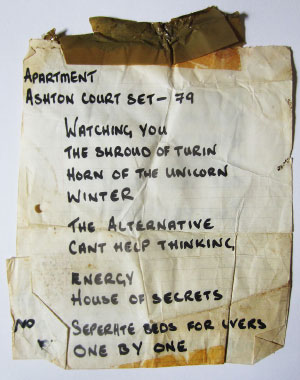
Sept ’78: Bassman Richard White (19) recruited, through ad in Biggles Music. He introduces his friend Emil Joachim (17) on drums, and they combine with AG and PL to form Apartment. The multi-talented EJ is easily Alan’s longest-serving creative partner from this early period, lasting till Mar ’83. He not only provides precision, metronomic drumming, with superb dynamics, but collaborates on songwriting, and even creates graphics for posters and backdrops. Apartment rehearses in the garage of AG’s home in Downend, and plays many successful local gigs. Emil says that audiences seemed almost intimidated by the band, with Alan’s minimal between-song rapport adding an air of menace…which was exactly the intended effect. Starting out as a four-piece, Apartment present an anomalous appearance, with two left-handed guitarists. Studying b/w glossies of one of their gigs, we see that they don’t really look like a band. (Not unheard of, this, even amongst the big guys—think of the later Clash incarnations, or even 10CC). This all changes when…
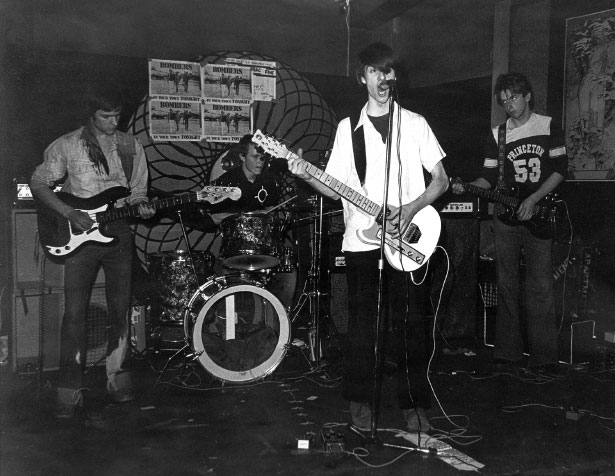
Mar ’79: PL leaves the band. Years later, he was unkindly airbrushed, (or rather, cropped) out of the AG-authorised history of Apartment, as presented in the photos and text of the Compilation CD released in 2016. (Alan’s self-invention again). This cannot alter the fact that, early on, Apartment are highly-reliant on a number of AG/PL-penned numbers to fill out their set. (In all his early recordings, honest Al pays scrupulous attention to the writing credits; the tape boxes and lyric sheets provide ample handwritten evidence of Mr. Large’s co-authorship of many good songs; the late ’77-early ’79 boxes all say: “All songs written by Griffiths/Large”, with AG retaining the sole production credit. Also, he is always the lead singer).
Oct ’79: Apartment track The Alternative, a notable Griffiths/Large composition, included on nationally-noted compilation Avon Calling, produced by Simon Edwards.
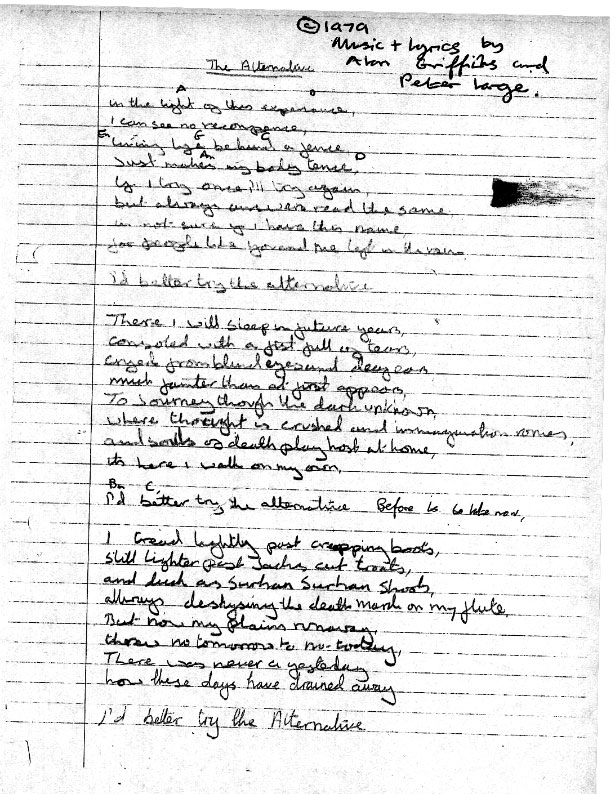
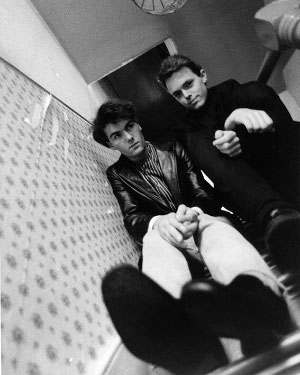
Dec ’79: Single The Car/Winter recorded at Crescent Studios, Bath; the B-side again a Griffiths/Large collaboration.
Early ’80: Steve Street (24), ex Europeans, temporarily joins on Bass, allowing RW to play Lead. Back to a 4-piece again! The band’s reputation gains them prestige support slots: they open for The Cure, and their performance is recalled as a triumph by all concerned, with encores demanded; they also support The Gang of Four.
Mid ’80: Apartment split. Musical differences, apparently. This has the predictable effect of blowing the considerable following they have built up since early ’79. Nonetheless, AG and EJ continue building a body of new material for their next joint venture, The Escape, which emerges, after a long gestation, in mid ’81. During this period they seek a new Bass player, and settle on Neil Acton. The new 3-piece band extends the Apartment ambience further into Gothy monochromatic darkness. Appropriately they all wear black.
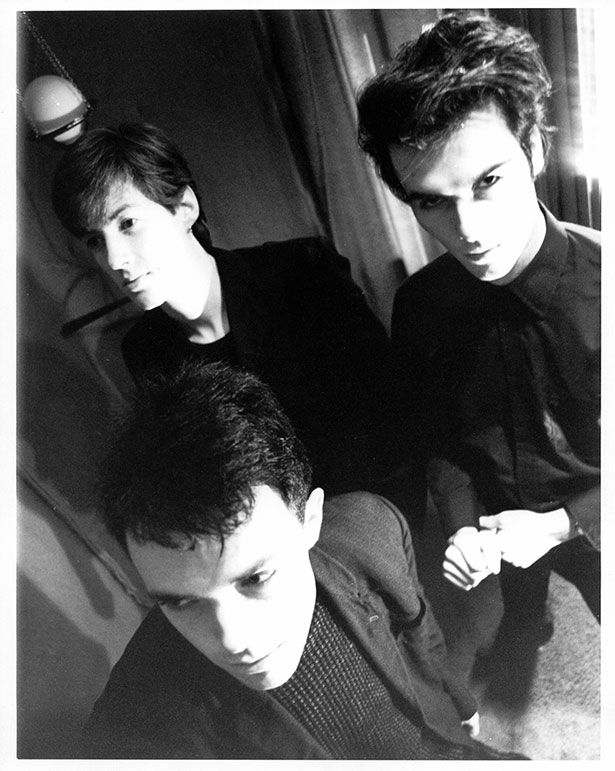
Sept ’81: Debut of The Escape at Trinity Hall, Bristol.
Alan’s subsequent career was well-documented by himself and others, both on this site and elsewhere. We now take a more detailed look at his newly-discovered mid-70’s output, relating it to his later work, where appropriate:
3. Al the auteur; recurrent themes/ideas/motifs, in the Griffiths oeuvre:
In Alan’s best work there is no narrative arc, no three-act structure. He points no moral; he declares his love for no-one. Instead, he aims for instantaneous euphony and sonority–the sonorities of his dark words, as they jostle and bed down, in grim conjunction. This is not to suggest the songs are random verbiage (except perhaps The Free World, noted earlier!); we notice repeated situations, perceptions, obsessions, from first to last; between 1977-80, Alan and his co-writers changed with the times, abandoning Teen Angst for Post Punk–moving from the light to deep shade. Hence the following paragraphs are in roughly chronological order, with some songs fitting into more than one category:
(i) Raw Teen Vitality/Angst/Ennui
Before we start, you might object that the above are the shop-worn subjects of many formula late-seventies punk lyrics, in which there was, even then, a hint (here comes the “i” word, sorry) of irony. I think that young Al (and Pete) sense this, so there’s often a droll, parodistic tone to their own lyrics, notably in songs like Alive and Kicking: We’re Alive and Kickin’,but we don’t know what to do!/We’re Alive and Kickin’, maybe we’ll kick you! and You say we ain’t got the manners/And we act like a bunch of spanners! Great rhyme boys, and the song is delivered with manic speed, and punctuated with machine-gun drum-fills. Likewise, They Wanna be Us! makes the hackneyed contrast between They (presumably anyone over 25) and Us (beautiful, feckless, dynamic youth). Good guitar solo though. But, in the already-noted The Unwanted Blues, Alan clouds over, lamenting: I used to walk where I wanned, till they put up a Curfew!… and, in The Book, The Table, he glumly reflects: What a vacuum/my life has become! The title tells all in another song: Why Can’t I be Like I used to be? Then, like the adolescent he is, he brightens up again for the much more upbeat Energy!, breathlessly boasting: Energy! I have an abundance of Energy! With muscles at full-stretch, and go-faster spin! which indeed he has, in a stunning performance from himself and the entire band, well caught by Al the boy producer—a rockin’ Succes d’Estime.
(ii) Blocked/Thwarted Relationships, Unrequited Love
These figure in several songs, like I’m X, The Unwanted Blues, Just to Carry On, and Lady, Lady. Alan hardly ever wrote a simple, declarative love song, the prominent exception being the beautiful An Hour, but even that seems somehow overtaken and then brought low by tristesse, notably in the brief, mournful guitar solo, and the piece’s overall minor key.
(iii) Anticipatory/Clairvoyant song titles
Alan, with various collaborators, wrote songs with the following titles: Sign of the Times, Hello, this is London Calling, In the City, The Free World, etc …….you’ve probably guessed what I’m going to say next.Yup, written in the seventies, they all pre-date their more famous namesakes–or near-namesakes–sometimes by years. I guess this is not uncommon with any musician or band, but here, the coincidences pile up–was Alan psychic?
(iv) Quirky/Enigmatic/Gloomy Lyrics
A Liquid likes to be in a Bubble/An Arsonist likes to be amongst Rubble! A disturbing couplet, spotted in the middle of All I Want is Rock and Roll, otherwise one of Alan’s sprightliest numbers.
…And if she hangs her flesh/Around the body’s crown… from An Hour. A sensual but ambivalent image, showing that Alan could write sexy, when he wanted to. From the same song: The Ark is docking/ On the wings of a Dove…. Sung on a rising inflection.
As previously remarked, the shadowed work, either desolate or entombed, started in Alan’s middle period, reaching its maturity in the Apartment and Escape days. From Third Floor: When I walk/And touch the walls/Feeling the depth/In what calls/ There’s some kind of Third Floor/ A lost cabaret… A lost cabaret– an image worthy of Poe, suggesting a long-ago-walled-up revelry, now sealed from our eyes…but with the doomed and skeletal celebrants still continuing a private Danse Macabre.
From Eden: Your umbrellas of Torture/Hang over me everywhere. This caused chuckles at the time, but it’s a striking image. Also, from the same song, and going up a scary octave on the final word: She laughed, exploded politely, and SAID….
From Silent Running (A slow, gothy, sleep-walky number, with a title borrowed from a film): Crumbled Faces/In a silk-screen net/ They’re…Silently runnin’/ Never forget! There’s a Bauhaus feel to these verses–Germanic, low-key–maybe recalling Marlene Dietrich movies?
Winter is…how I feel… the final line of from Winter.
(v) Religious Imagery
For a non-churchy young man, Alan seems to have frequent, almost damascene, visions and revelations. He is racked by these experiences, which assail him again and again: he goes to church on Sunday, (until he gets thrown out of the club)…sees Jesus on his cross….steals the Holy Shroud of Turin…. ….. and even, in the later, Escape days, presumes to enter Eden, but is then not impressed: It stinks! apparently. Thoroughly dissillusioned, he then asks: Do you believe in Heaven, or are you… prepared to wait? Earlier, he [Ran] with the tablets, Oh Moses would be proud/ Contradicting the King is just not allowed! Oh, God help a man/ Help this man to be! he pleaded. But now, An Agreement with Heaven/Is way out of hand/All the sages have quit/The promised land! Even the earlier, four-square The Book, the Table feels religioso, if only for its title. (Does he mean the good Book?) The same applies to the much lighter, attractively-poppy Christian Thing Christian: Christian thing, Christian man/ You die laughing, I just die. Did Alan covet the certainty of resurrection, and hence envy the devout?
Moving on, and down, (way down), Alan also has things to say about the hot place, and its proprietor. Hell is sometimes threatened as a punishment, and Old Nick himself appears at least twice: The Devil wants to steal your soul/ But all I want is Rock ‘n’ Roll! And Don’t tell the Devil/He sees you at night/ Don’t tell the Devil/He hates the electric light! (A wondrous couplet…but what could it mean?)
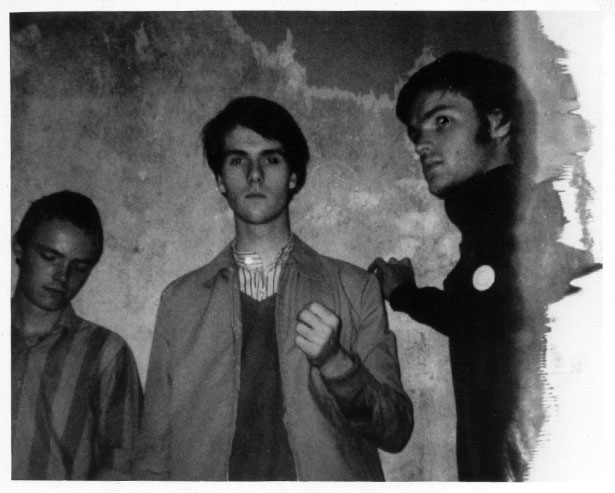
(vi) Death
I’ve left this till last, as we all do. Roughly a third of Alan’s songs theme-or at least, mention-death. Did he have premonitions of his own early departure? Away from the mixing-desk, (or writing table), and back in propria persona, Alan would talk, now and again, about the premature deaths of his father and grandfather, and make blackly-humorous remarks about what that might mean for him. He was told not to be so morbid, (which one regrets now) and anyhow, he didn’t seem prone to brooding over it.
Nonetheless, very early on, White Cliffs of Dover (1976) features the ruminations of a young man contemplating suicide, (as does Poison, a later, Apartment song) and Cry Little Girl, also from ‘76, mentions the death of the title girl’s father. Death, by name or implication, also features in the later Don’t Tell the Devil, Separate Beds for Lovers, The Alternative, Lately, The Desperation, Stony Ground, Christian Thing Christian, and The Road to Limbo. From the Escape days, we can also add I’ll Pretend to Kill You, and The Retrospect.
4. Turn the last page; Summing up
Alan had a forty year span as a musician, creating, playing, recording, singing; first as amateur enthusiast, then landing a contract on a big label and turning pro. Later, as a session guitarist-and writer-producer with a major, internationally-acclaimed act. Finally, as the money went out of writing and selling original music, he turned Sound-Designer for TV (notably CSI) and for film trailers, keeping several Terabytes of audio samples in three hot disc-drives in his tiny studio, assembling them on a virtual desk, then sending the finished files to remote US studios via the web.
From his teens, he was interested in music production, teaching himself the rudiments of mike placement, overdubbing, getting levels and EQ right, as well as arbitrating squabbles between band members! Between 1976-8 he and two different co-writers turned out upwards of 50 songs, tackling many diverse genres, often coming up with catchy, attractive works. His musical tastes (Queen, 10CC, even Supertramp) were conventional for that time. A very different time. But his most characteristic work, wherein he felt most truly at home, and in which he would most like to have succeeded commercially, came a bit later. It’s the Alan of this period I first met and now remember most fondly. The lean, gaunt, esurient guy, looking every bit the suburban Sid Vicious in some shots—but with carefully-crafted quiff—scowling at the camera in the approved way whilst a pic was snapped…before relaxing and breaking into a smile again—that lovely smile—when the camera was down. But maybe this amiable appearance masked an inner creative turmoil, or even, a double life…Alan’s songs of this time conjure up a bleak, malevolent milieu, a dank and grey landscape, with nihilism and pain to the fore, violence and war frequent, alienation rampant, and interpersonal negotiation and settlement quite impossible. Where God is in abeyance, and not taking calls. A world in which death seems an attractive alternative, a merciful evasion.
…..All of which is odd, as the imaginings of a smiling, waggish son of North-East Bristol, who never outgrew his love of Thunderbirds, (and retro TV, generally). No misanthrope he, Alan maintained a wide circle of friends, (surprisingly unknown to each other until after he left us), but united by a common knowledge of music–either as player, producer, or simple enthusiast–or of film and TV history and technique. Alan brooked no ignorance; you wouldn’t survive long as a Griffiths “disciple” without knowing your stuff. Alan himself was a self-taught artist-naif who seldom opened a book, but his great, untutored creativity flowed from life to art with the casual ease of an amiable strum.
…So, now the house has given up all its secrets, and stands blank, gutted and For Sale. And you’re standing, (or lying) still, Al, in a plot in Downend. We all stood still when you left us. But we remember to mention you…from tapes you left behind.
John Ounsted, 10/9/18, with thanks to Emil Joachim, John Fenlon, Mike Darby, Steve Street, Dave Massey, Marcus Valentine, Brother Andy… and with love to Alan. I hope his life’s not a blur in retrospect……… Merci le Livre, Merci la Table.
Postscript: Mr Large looms large over Alan’s middle period, and is still at large now. Pete, if you read this piece, please make contact, I’d like to talk to you about Alan. (Ditto other guys from mid 70’s Soundwell days).





















